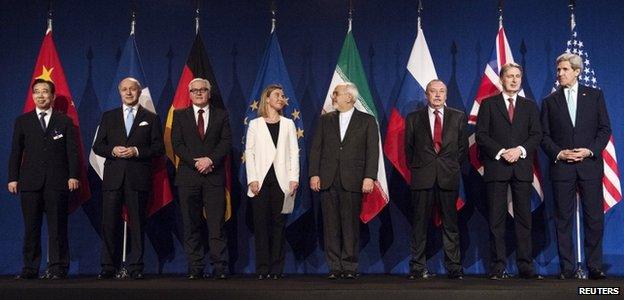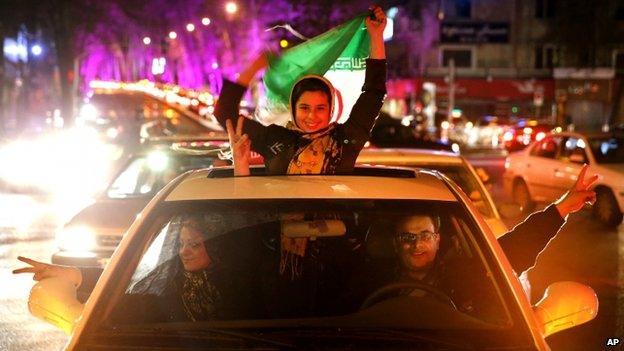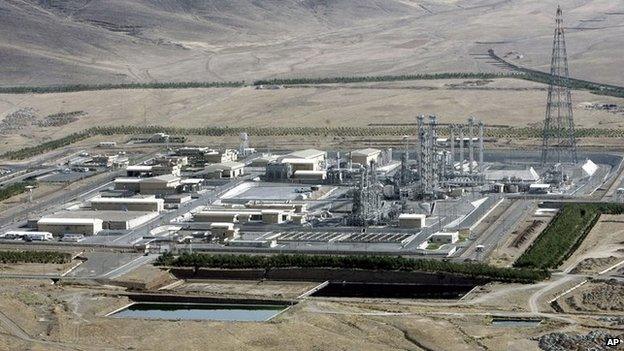Iran nuclear talks: 'Framework' deal agreed
- Published
Barack Obama on Iran deal: "We will be able to resolve one of the greatest threats to our security and to do so peacefully"
An outline agreement on the future shape of Iran's nuclear programme has been reached after marathon talks with six major powers in Switzerland.
Under the deal, Iran will reduce its uranium enrichment capacity in exchange for phased sanctions relief.
US President Barack Obama said a "historic understanding" had been reached with Iran.
The world powers and Iran now aim to draft a comprehensive nuclear accord by 30 June.
The framework agreement was announced by the European Union and Iran after eight days of negotiations in Lausanne.
The talks between the so-called P5+1 - the US, UK, France, China and Russia plus Germany - and Iran at Lausanne's Beau-Rivage Palace hotel continued beyond the original self-imposed deadline of 31 March.

Analysis: Barbara Plett Usher, BBC News, Lausanne

After a missed deadline and two exhausting nights of negotiations Iran and the six world powers presented their framework as a major achievement.
The EU's top diplomat, Federica Mogherini, read out a joint statement outlining the main points, including a reduction in the number of Iran's operating centrifuges, changes to its nuclear facilities, and a promise to lift sanctions if these steps are verified.
This is an unwritten understanding, not a formal agreement, and it lays the foundation for very tough negotiations on the details.
But for now its architects are celebrating a hard won, potentially historic, achievement.

Iran denies Western claims it is trying to build a nuclear weapon. It entered negotiations in order to see sanctions lifted.
'Unprecedented verification'
According to a US factsheet, external issued after the talks, the outline deal includes the following conditions:
Iran will reduce its installed centrifuges - used to enrich uranium - by two-thirds and reduce its stockpile of low-enriched uranium
The centrifuges that are no longer in use will be placed in storage, monitored by the International Atomic Energy Agency (IAEA)
All of Iran's nuclear facilities will be subject to regular IAEA inspections
Iran will redesign its heavy-water reactor in Arak so that it cannot produce weapons-grade plutonium
US and EU sanctions related to Iran's nuclear programme will be lifted in phases, but can be brought back if Iran does not meet its obligations.
Mr Obama said the deal's implementation would be closely watched. "If Iran cheats, the world will know it," he said, adding that the deal was based not on trust but on "unprecedented verification".
He said the framework agreement had come after "months of tough, principled diplomacy", and that it was "a good deal".
Iranian Foreign Minister Javad Zarif: "We have built mutual mistrust in the past, and I hope that... some of that mistrust could be remedied"
Obama 'selfies'
Mr Obama's statement was broadcast live by Iranian broadcaster IRINN - a very rare move in Iran, where TV channels are controlled by the state - and there were celebrations in the streets of the capital, Tehran, over the breakthrough.
Some Iranians took "selfies", external with their TV sets to mark the occasion.

Iranians have taken to the streets of Tehran to celebrate

Under the deal, Iran's heavy-water reactor in Arak will be redesigned so it cannot produce enriched plutonium
In a BBC interview, US Secretary of State John Kerry said there was a point he was tempted to walk away from negotiations but added "the bottom line is we worked through it".
The draft deal was hailed by UN Secretary-General Ban Ki-moon, who said he believed it would "contribute to peace and stability in the region".
"It will respect Iran's needs and rights while providing assurances to the international community that its nuclear activities will remain exclusively peaceful."
'Big day'
EU foreign policy chief Federica Mogherini announced the deal at a news conference alongside the Iranian Foreign Minister Javad Zarif , saying that a "decisive step" had been achieved.
Negotiators would now start "drafting the text" of the plan "guided by the solutions", she added.
Mr Zarif, meanwhile, said the full nuclear deal would be "something actually very innovative" as Iran would be able to sell enriched uranium in the international fuel market.
The joint EU-Iran statement said work could now start on a "comprehensive deal" to limit Iran's nuclear programme
Russia welcomed the deal as recognition of "Iran's unconditional right to a peaceful nuclear programme", while French Foreign Minister Laurent Fabius told reporters: "It's a positive step, but at the same time there are still questions and details that need to be resolved."
But Israeli leader Benjamin Netanyahu told President Obama in a phone call that a deal based on the agreed framework would threaten the survival of Israel.
For his part, President Obama told Mr Netanyahu the deal "in no way diminishes our concerns with respect to Iran's sponsorship of terrorism and threats towards Israel," the White House said.
The deal has also been criticised by members of the US Congress who want US lawmakers to have the right to review any final agreement.
US House Speaker John Boehner said the deal represented an "alarming departure" from Mr Obama's original goals and that Congress should review the deal before sanctions on Iran were lifted.